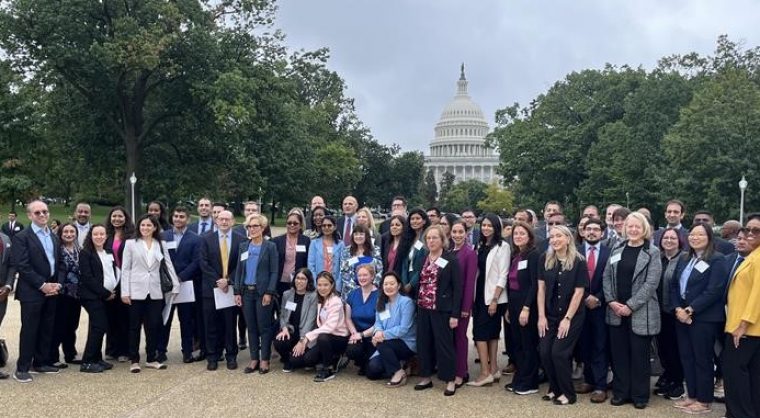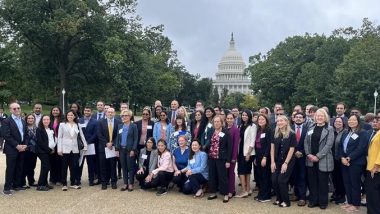WASHINGTON, DC – Today, the American Gastroenterological Association (AGA) – representing more than 16,000 physicians – held its annual Advocacy Day, bringing together nearly 100 members and patient advocates from 28 total states to educate members of Congress and their staff about policies impacting GI patient care such as step therapy, Medicare reimbursement reform, and federal research funding.
“There’s nothing more important than advocating for our patients – whether it’s in the exam room or in the halls of Congress,” said Maria T. Abreu, MD, AGAF, President of AGA. “AGA is proud to work closely with lawmakers on policies that prioritize access to evidence-based medical treatment, remove obstacles from insurers that delay care, and ensure physicians are appropriately reimbursed. We are also pushing to expand the federally funded biomedical research enterprise and protect the National Institute of Diabetes and Digestive and Kidney Diseases.”
Specifically, advocates met with members of Congress to discuss priority issues that are seriously impacting the gastroenterological community:
1. Reducing prior authorization burdens for physicians and patients
Prior authorization is a utilization management tool used by insurance companies that require physicians to receive approval before performing a service. It negatively impacts patient care by delaying much needed treatment and consumes valuable physician and staff time that should be spent on patient care.
AGA supports the Improving Seniors’ Timely Access to Care Act (H.R. 8702/S. 4532), which would increase transparency for prior authorization and streamline the process under Medicare Advantage.
2. Putting guardrails around step therapy
Step therapy, also known as ‘fail first,’ is utilized by insurers to determine drug coverage and requires patients to try and fail on insurers’ preferred medications before covering the initial therapy prescribed by their health care provider. This practice jeopardizes the physician-patient relationship, since it bypasses what the physician believes is the best treatment for their patients.
Ensuring timely access to care is critical for patients, especially those with GI diseases. To help streamline patients’ access to care, advocates today called on lawmakers to support The Safe Step Act (S. 464/H.R. 2163), which would provide a clear and timely appeals process when a patient has been subjected to step therapy.
3. Blocking Medicare cuts and ensuring fair reimbursement for doctors
Earlier this year, the Centers for Medicare & Medicaid Services (CMS) proposed slashing Medicare Physician Fee Schedule (MPFS) reimbursements for doctors by 2.8% starting on January 1, 2025. Due to years of successive cuts to the MPFS, Medicare physician payment effectively has declined 29% between 2001 to 2024, when adjusted for inflation, according to the American Medical Association.
There are multiple pieces of legislation in both chambers to address this issue. AGA is asking Congress to address the 2.8% cut and explore more permanent solutions on Medicare physician reimbursement.
4. Stopping misguided efforts to restructure the National Institutes of Health (NIH)
During the House Labor, Health and Human Services (LHHS) markup of the Fiscal Year 2025 funding bill, the House Appropriations Committee included language that would consolidate the NIH from 27 institutes down to just 15. If passed into law, this would result in the National Institute of Diabetes and Digestive and Kidney Diseases (NIDDK), one of the main areas of interest for gastroenterologists, being merged with two other groups to form a new institute called the National Institute on Body Systems Research. This restructuring would make it even more difficult to secure research funding for gastrointestinal diseases by having to compete with more disease states.
AGA opposes this restructuring. During today’s Advocacy Day, advocates urged Congress to go through regular order before considering reforming NIH, our nation’s premier research institution. This includes seeking feedback from stakeholders and conducting committee meetings.
5. Increasing digestive disease research funding for NIH, the Veteran’s Administration (VA), and Department of Defense (DoD).
For the research community to continue to produce innovative biomedical research that leads to improved treatments and, ultimately, cures, it requires consistent funding that keeps pace with medical research inflation and ensures the pipeline of future researchers.
During advocacy day, AGA advocates asked Congress to support:
- NIH funding at $51.3 billion for FY2025.
- VA funding at $1.05 billion for FY2025.
- DoD:
- Continued funding for GI diseases in the Congressionally Directed Medical Research Program (CDMRP).
- Create and fund the Colorectal Cancer Research Program as a separate item from CDMRP and fund it at $20 million for FY2025.
###
Media Contact: Rebecca Reid, rreid@schmidtpa.com, 410-212-3843
About AGA
The American Gastroenterological Association is the trusted voice of the GI community. Founded in 1897, AGA has grown to more than 16,000 members from around the globe who are involved in all aspects of the science, practice, and advancement of gastroenterology. The AGA Institute administers the practice, research, and educational programs of the organization. For more information, visit www.gastro.org.














